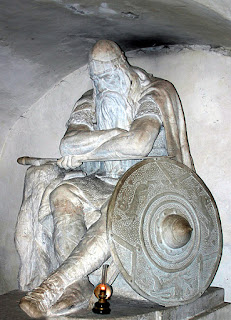Does the hero die a hero, or does she survive?
In our worship of the mortal champion for good, is it imperative that the hero dies in the act, or do we need her to live?
What is this uniquely human construct of the hero? Why is it important for us to imagine the hero? Is the individual savior, or even a succession of hero individuals, the true constituent that will save us?
Or is it that a higher-level entity comprised of individual humans is the real savior, and that the individual only takes credit because that is the only way our evolved conscious is capable of telling the story? Does the fact that the onus of our past evolution was the individual cause us to only be able to think of heroes as individuals? Can we elevate our understanding of evolution and the narrative of the struggle to encompass the larger community comprised of individuals?
Rationally and evidently we know that the larger community - that which is larger than the individual tribe and consisting of more members than each individual can keep track of - is the entity effecting real and lasting change. The mark of the hero is self-sacrifice for the common good, but it is for the sake of, and brought about by, the community and the common good. Where we aim our admiration and how we tell the story is a product of our evolved way of thinking, but it is also a way of thinking that we have evolved a capacity for elevating, and we now have the resources and the knowledge to make this transition.
Hero has a meaning, and only needlessly do we need to change it. But perhaps we need another term to properly tell the tale of the hero-community?
The individual hero eventually dies, whether in the heroic act or not, but both the true originator and the benefactor - the community - survives.
Holger Danske rises up against the invading forces, but is personified not by a single individual but as a group.
Portrait of a Jovian satellite
4 days ago in Doc Madhattan

















